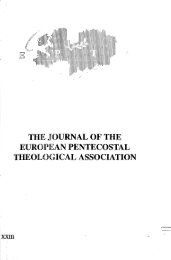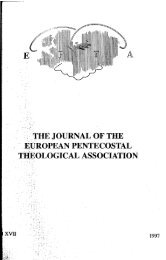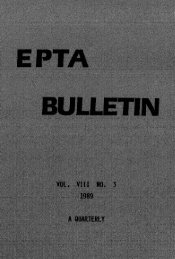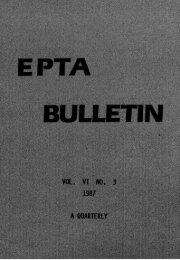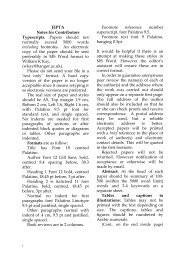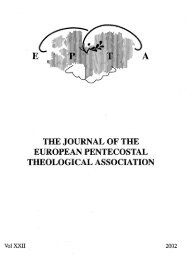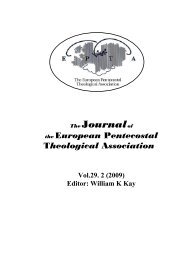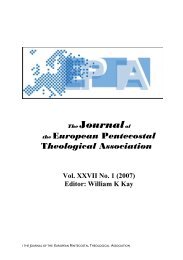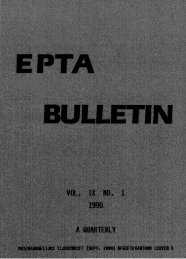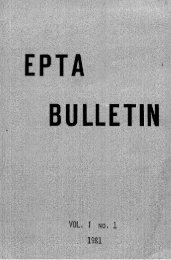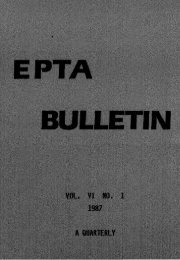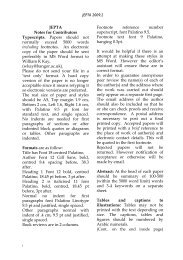jepta 2001 21 - European Pentecostal Theological Association
jepta 2001 21 - European Pentecostal Theological Association
jepta 2001 21 - European Pentecostal Theological Association
You also want an ePaper? Increase the reach of your titles
YUMPU automatically turns print PDFs into web optimized ePapers that Google loves.
The Journal of the <strong>European</strong> <strong>Pentecostal</strong> <strong>Theological</strong> <strong>Association</strong>, Vol. XXI, <strong>2001</strong><br />
those between the races.' Perhaps it was the reality of American society of the<br />
second decade of the last Century that suggested to the pragmatic policy-makers<br />
that founded the first <strong>Pentecostal</strong> denominations that these bamers should for<br />
purely practical reasons be reinstated.' The fact is that the formation of the<br />
<strong>Pentecostal</strong> denominations that were formed in that period were all organized<br />
along racial lines. No doubt this did not happen out of some sinful principle (the<br />
supposed superiority of the white race), but because they felt that interracial ties<br />
hampered the purpose of spreading the Gospel in an American society which was<br />
dominated by white people. Whatever the motivation, it led to the reinstatement<br />
of a huge dividing wall, and it constituted a break with the original vision of the<br />
Azusa Street Mission revival. This barrier - like all other such bamers - resisted<br />
demolition for many decades.<br />
A last aspect to be considered at is the stress on the priesthood of all believers,<br />
which is dear to all Protestants. This notion harmonizes well with the <strong>Pentecostal</strong><br />
stress on individual salvation and with the conception of the Church as an<br />
assembly of true believers. This in turn squares well with the egalitarian note of<br />
the baptism of the Holy Spirit as an equipping of the saints for living a Christian<br />
life in the present world.<br />
A curious antithesis may be observed here. The egalitarian character of so many<br />
aspects of the <strong>Pentecostal</strong> conception of the Church stands in stark contrast to the<br />
rather high degree of clericalization of many <strong>Pentecostal</strong> denominations. To be<br />
eligible for many functions in <strong>Pentecostal</strong> denominations, recognition as a (lay)<br />
minister is required. In that sense, many <strong>Pentecostal</strong> denominations are closer to<br />
the authority structure of the Roman Catholic Church.' This tension between<br />
theory and practice, I believe, should set <strong>Pentecostal</strong> theologians to thinking<br />
about what the Church is.<br />
CONCLUDING REMARKS: ROOM FOR CONVERGENCE<br />
Catholics and <strong>Pentecostal</strong>s differ radically in their conception of the Church, so<br />
much so that one Catholic delegate once confided to me outside of the plenary<br />
' See D.T. Irvin, "'Drawing all Together in One Bond of Love': The Ecumenical Vision of<br />
William J. Seymour and the Azusa Street Revival", in Journal of<strong>Pentecostal</strong> Theology 6 April<br />
1995,25-53.<br />
' Robeck, "<strong>Pentecostal</strong>s and Ecumenism", 7. From the text of the "Preamble and Resolution of<br />
Constitution" in the Minutes of the General Council of the Assemblies of God in the United<br />
States ofAmerica, Canado and Foreign Lank held at Hot Springs, Arkansas, April 2-12, 1914<br />
(in: W.W. Menzies, Anointed to Serve, Springfield: Gospel Publishing House, 1971, 99-loo), it<br />
is clear that pragmatic consideration played a major role in the formation of the Assemblies of<br />
God.<br />
This is also noted by Hunter, "'Wij zijn de kerk"', 22-23.<br />
The Place of the Church in the Economy of Salvation. Roman Catholic and<br />
<strong>Pentecostal</strong> Perspectives: Room for Rapprochement Huibert Zegwaart<br />
Dialogue session that <strong>Pentecostal</strong>s really have no idea as to what the Church<br />
really is. If this judgment is correct, it would be a sad comment. Hocken, in his<br />
article on the "Theology of the Church is much milder in his assessment. He<br />
notes developments that indicate an increasing readiness among <strong>Pentecostal</strong>s to<br />
work out an authentic doctrine of the Church.' This, it would seem, is imperative<br />
also for the consolidation of the growth of the past decades. The Catholic-<br />
<strong>Pentecostal</strong> Dialogue, as well as the Dialogue with the World Alliance of<br />
Reformed Churches (WARC) that started in 1995, provides ample opportunity to<br />
do so.<br />
But is there - in view of the enormous differences - any room for rapprochement<br />
It would seem so! Serious theological reflection on the Church in relation to other<br />
areas of <strong>Pentecostal</strong> theological reflection is still in its infancy. This means that<br />
<strong>Pentecostal</strong>s will have to put up a sustained effort to develop an ecclesiology<br />
which is faithful to the biblical record, to the various theological traditions within<br />
Christianity, to the experience of the Spirit in the lives of individual believers and<br />
in the people of God, and - not least - to the original vision of the Founding<br />
Fathers of the Movement. It may be clear that this calls for a concerted effort, not<br />
of one or two ecclesiologists, but of a whole group of <strong>Pentecostal</strong> theologians in<br />
various denominations, who interact with each other intensively.<br />
Harold Hunter lays down what he feels should be the basic tenets of such a<br />
<strong>Pentecostal</strong> ecclesiology. These sound surprisingly Catholic. A reliable<br />
ecclesiology, he thinks, must be in line with the characteristics laid down by the<br />
councils of Nicea and Chalcedon, which saw the Church as One, Catholic, Holy<br />
and ~postolic.'<br />
This brings the International Roman Catholic-<strong>Pentecostal</strong> Dialogue within view<br />
once more.' Precisely because the Roman Catholic Church is so strong in the area<br />
of ecclesiology, <strong>Pentecostal</strong>s,despite the fact that the overriding theological<br />
categories stem from soteriology, can listen critically to what Catholics have to<br />
say about this matter and learn from them. Not that I would want <strong>Pentecostal</strong>s to<br />
swallow the whole of Catholic ecclesiology. On the contrary, they have to have<br />
their own theological criteria for what is worth incorporating and what may better<br />
be left aside. However, these criteria, I am convinced, will turn out to be<br />
primarily shaped by soteriological categories in conjunction with categories that<br />
' One of the developments, he singles out, that contributes to a raised consciousness of the need<br />
to reflect on the theology of the Church is the Catholic <strong>Pentecostal</strong> Dialogue.<br />
' Hunter, "' Wij zijn de kerk"', 26.<br />
It would seem to me that the International Roman Catholic-<strong>Pentecostal</strong> Dialogue would benefit<br />
from a separate round on the place of the Church in the economy of salvation, as it will provide<br />
a good context for articulating some of our most fundamental differences.



